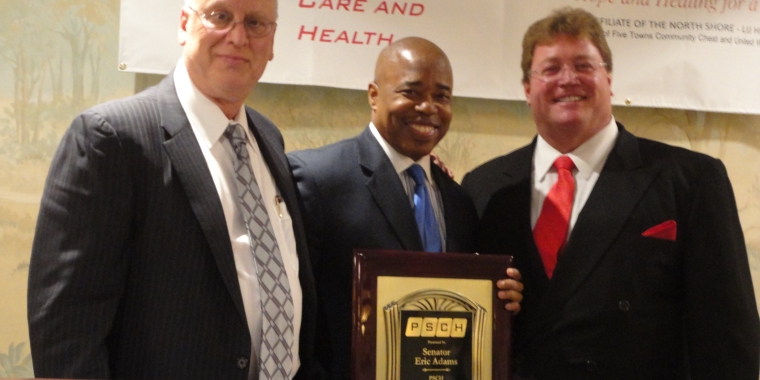
NYS Senator Eric Adams Demonstrates a “Family Flu Defense Kit” for the H1n1 “Swine” Flu
Eric Adams
September 29, 2009
-
ISSUE:
- Health
NYS Senator Eric Adams was joined on Sunday, Sept. 27, 2009 by Dr. Phillip Hew, Director of Emergency Medicine, Kingsbrook Jewish Medical Center, Jonathan Swerdlin, Founder and President, Flu Armour, and Seth R. Segel, Executive Vice-President, Cantel Medical Corp to exhibit and give a demonstration of the proper use of supplies in an H1N1 Family Flu Defense Kit, including face masks, gloves, hand sanitizers, and disinfectants.
Senator Adams’ statement: “H1N1 (‘Swine’) flu is a contagious new influenza virus first detected in the U.S. in April 2009. It spreads in the same way that regular flu viruses spread, from person to person via coughing or sneezing. Preventive measures are the first line of defense, and a prudent approach includes the acquisition of supplies that will comprise a ‘Family Flu Defense Kit.’
“Infection prevention and control products that have proven their effectiveness include flu masks, gloves, hand sanitizers, and surface disinfectants. It is essential that New York State be prepared, and our citizenry should be educated in the use of these resources.
“I will introduce legislation in the Senate to be known as the ‘H1N1 in the workplace prevention act’. The bill, equivalent to NYS Assemblyman Rory I. Lancman’s A9156, will require employers to post H1N1 influenza related information.
“In June, the World Health Organization declared that because of the rapid spread of this flu, a global influenza pandemic (an outbreak caused by the totally new strain, the H1N1) had begun. More than 70 countries have reported cases, and the U.S. has the largest number. It is therefore essential that New York State be prepared and that we dedicate ourselves to prevention and control using careful surveillance, swift detection, and methodical isolation.
“Symptoms of H1N1 include fever, cough, sore throat, runny or stuffy nose, body aches, headache, chills, fatigue, and possibly vomiting or diarrhea, and cases have ranged from mild to severe. Although a majority of people who have contracted it have recovered without any medical treatment, a number of hospitalizations and deaths have occurred. Individuals should take common sense steps to protect their health and the well-being of others: cover nose and mouth when coughing /sneezing, wash hands often, avoid frequent touching of one’s face, stay away from sick people, remain at home when ill, and abide by public health advisories.
“We should carefully review the New York State Department of Health Pandemic Influenza Plan. We must have: an adequate supply of flu masks for our first responders; a system to allocate needed resources, including flu masks, anti-viral drugs, and additional hospital beds for possible triage centers; coordination of information about resource needs and availability among local government, hospitals, schools, and the private sector; dissemination of information about preventive measures and treatment alternatives; and a blueprint for the maintenance of essential infrastructure services (such as mass transportation, police, and health services) in the event of widespread illness.”
# # #
Share this Article or Press Release
Newsroom
Go to Newsroom
Senator Adams joins daughter of Nelson Mandela
October 21, 2013

Have Electronic Clutter? Upcycle Electronics for FREE!
October 21, 2013

Job Fair at Kings Plaza
October 21, 2013